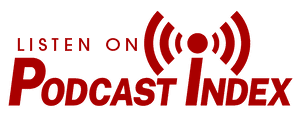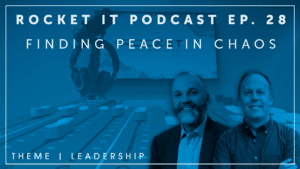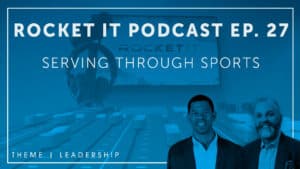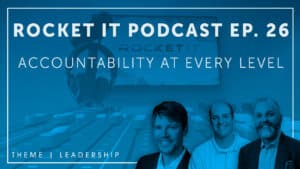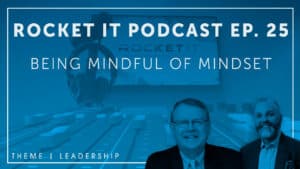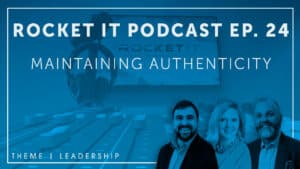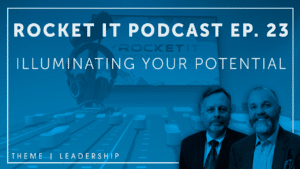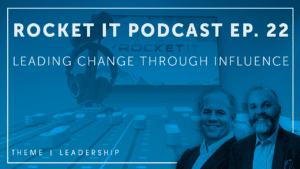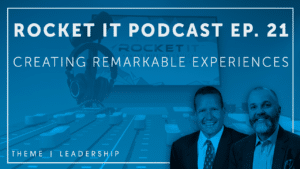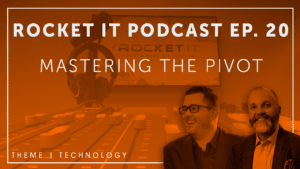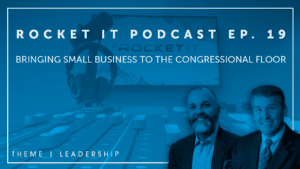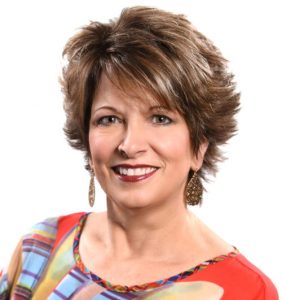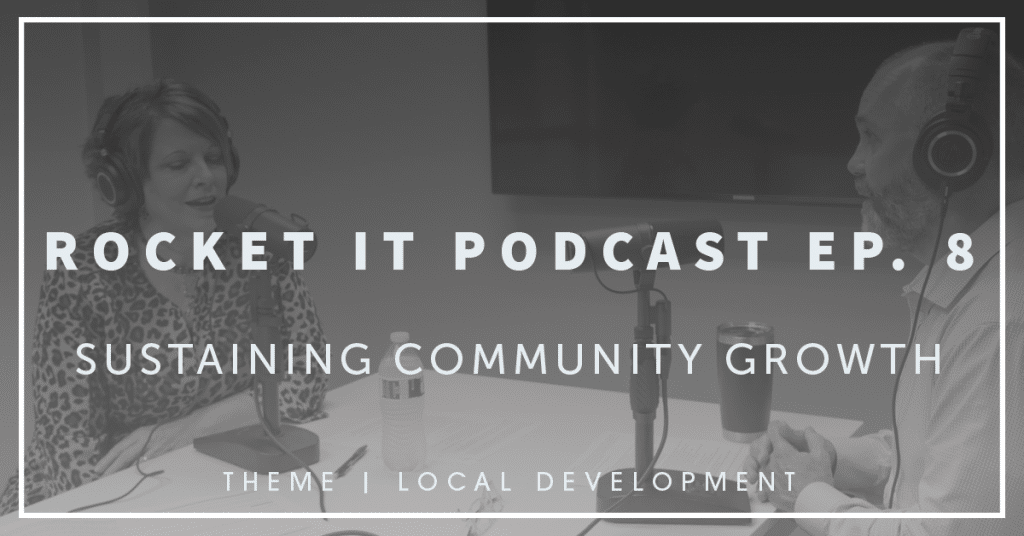
Rocket IT Business Podcast | Lisa Zaken | Sustaining Community Growth | Ep 8

Understanding where you and your business fit within the larger scope of society is important for making positive impacts. But when it comes to educating, equipping, and engaging diverse community leaders, how does one inspire civic involvement?
In this episode of the Rocket IT Podcast, Executive Director of Leadership Gwinnett, Lisa Zaken, provides an in-depth look at the importance of leadership development courses, while highlighting the impact community outreach can have on a business’s success.
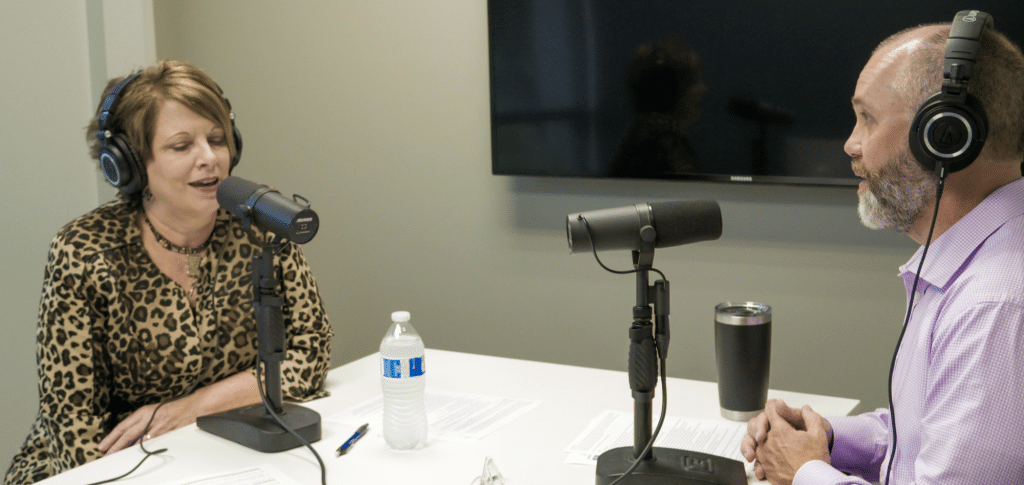
In This Episode, You’ll Hear More About
- The history of Leadership Gwinnett
- The impact of joining a leadership development course
- How empowered leaders can help sustain community growth
- What it takes to understand the true needs of a community
- The meaning of social responsibility
- How to leverage business connections for the betterment of the community
- The importance of passion driving your purpose
- The best methods of volunteering with limited time and resources
- How to reinvest in the community you serve
Resources Mentioned
Information on Leadership Gwinnett
Information on Glance Gwinnett
Traction: Get a Grip on Your Business
Simple Abundance: A Daybook of Comfort and Joy
Like What You Heard? Give Us Some Feedback!
- Host: Matt Hyatt
- Guest: Lisa Zaken
Show Notes
Matt Hyatt (00:00):
Hello and welcome to the eighth installment of the Rocket IT Podcast. I’m your host Matt Hyatt, and today I’m excited to introduce our guest, Lisa Zaken of Leadership Gwinnett.
Intro Music (00:10):
[Music Playing]
Matt Hyatt (00:27):
With a mission to educate, equip, and engage diverse leaders and inspire community involvement, Leadership Gwinnett has impacted thousands of people and hundreds of organizations in our area since 1986. In today’s episode, we’ll take an in depth look at Leadership Gwinnett and we’ll learn how programs like these help communities thrive. Welcome to the podcast, Lisa, we are glad you’re here.
Lisa Zaken (00:48):
Thank you, Matt. I’m delighted to be here.
Matt Hyatt (00:51):
Wonderful. Let’s dive right in. So I have done a little bit of a homework on Leadership Gwinnett. I checked out your history and you know I said we started in 1986 but I think I read on the website, 1984 was when a group of folks got together with the local chamber of commerce, the Gwinnett Chamber of Commerce with the idea. And the first class actually graduated in 1986 is that right?
Lisa Zaken (01:14):
That’s correct. Awesome. In fact, Charlotte Nash and Alvin Wilbanks were a part of that first class.
Matt Hyatt (01:20):
So Charlotte Nash is our County Chairman for the Board of Commissioners. And then Mr. Wilbanks leads the Gwinnett County Public School System. So they were, they were active in that first Leadership Gwinnett. The first year. I’ll look how that worked out. Exactly. Oh my goodness. But you haven’t been around nearly that long. You’re a fairly new leader of the organization over the last, how long has it been now? Seven or eight years?
Lisa Zaken (01:46):
Going on nine, nine years. Yeah. Took over in July, 2011.
Matt Hyatt (01:50):
Wonderful. And I know that,uI’ve seen the charts, everything has gone up until the right, since he took over. So a nice job, Lisa. So I am a graduate of Leadership Gwinnett, as you know. I think class of 2011. So I’ve been through the program firsthand and then Glance Gwinnett which we’ll get into it a few minutes.
Matt Hyatt (02:10):
My wife and several of our team members here at Rocket IT, you’ve gone through that program. Great experience for all of us. Isn’t that fun?
Lisa Zaken (02:17):
It’s great.
Matt Hyatt (02:18):
So tell me, tell me a little bit about back in the day, and I know you read your history book, just like I did to get this information right because we weren’t around for this, but back in the day when the program was founded, what was the driving cause there? What was going on that caused that to happen? Do you know?
Lisa Zaken (02:34):
Yeah, like you had said back in 1984 really the genesis started for the program. There was a group of community leaders that realized Gwinnett was changing from a rural agricultural community to really a more densely populated urban community. And while the growth was just exponential at that time, they realized they needed a group of folks to focus on all issues related to Gwinnett and make sure that the leaders were prepared and educated for this growth.
Matt Hyatt (03:01):
Right. So I moved to the area back in I think in 1991 or 1992 so it really wasn’t that long. It doesn’t seem like, this doesn’t seem like it was that long ago, but then you say, wow, gosh, you know, that was just within a few years of Leadership Gwinnett. But it’s changed a lot just in the amount of time that I’ve been here. I feel like I remember probably around 700, or a thousand or so people in the area at that time in Gwinnett County, and I know we’re up over a million now. Isn’t that right? Very close to a million. And the other thing that I think has continued to change, and it’s a very positive thing as we’ve become a much more diverse community over that time. We I think we are a majority minority County at this point. I know in our schools, the students, a majority minority there but all different races and backgrounds, people from all different parts of the world, different religious backgrounds, age groups. It is a very diverse area. And so how does Leadership Gwinnett embrace that change that’s happened over the last few decades? What’s the idea there when it comes to bringing folks together?
Lisa Zaken (04:08):
Well, the basis for the program, it’s a nine month program that provides a path between influential leaders in business and government and arts and healthcare and the social services and truly what they, what they get out of the program. But when they’re done is a true understanding of, of some major community issues. What is the glue that holds us together? What are the shiny objects in the community that we need to pay attention to? And then what makes us really great and cohesive. So the really great thing about the program over the last few years, really probably the last 10 years since I started, was embracing the diversity that is in Gwinnett. So our goal, one of our goals is always to make our classes reflective of the community. I would say it’s growing, but it’s not growing at the rate it needs to be.
Lisa Zaken (04:57):
We’re probably between 35 and 40% diverse with each class, meaning nonwhite participants in the class. And we find that’s critical. Especially with the large communities in Gwinnett, the Korean community, Hispanic community, Vietnamese community, everybody has the same goal in mind that they want a great community for their family. They want great education, they want good healthcare. But that all doesn’t happen just by accident. You have to have great leaders. You have to understand what the leaders initiatives are, how they can plug in in this program, educates them about that and opens the door for just endless opportunities for them to make when it better than they left it better than they found. It really is what I want to say.
Matt Hyatt (05:39):
Yeah, absolutely. I remember when I was going through Leadership Gwinnett back in 2011, I felt like we had a very diverse group. I remember that we had folks that from local nonprofits or even have folks involved in local churches. We had folks like myself that are involved in businesses, both small and large folks that were working for the County, the municipalities. And not only that, but I felt like we were a pretty diverse from a, just a background. And that means ethnicity. That means our family dynamics, a lot of different faith backgrounds. That felt to me like, you know what, this is a way for us to get together and make connections. We might not normally ordinarily have and work on something together. You know, what, roll up our sleeves and get involved in a project together, which as you know, builds relationships. That all felt very intentional to me. Is that part of the idea? Is that how, how you go about things?
Lisa Zaken (06:38):
It absolutely is and it really hasn’t changed from the very beginning. And so to join Leadership Gwinnett, it’s an application driven process, so you have to complete an application. The questions haven’t changed much over the years because it keeps aligned with our vision and mission. But you are literally graded on each application and there’s a committee each year that looks at the applications, looks at the scores and then slots those. Now we’re up to 42. We have 42 members in the class. Slots, those folks into very intentional groups. So there’s so many from education and there’s so many from business and so many from government. And so many from the nonprofits. And again, we try to align the diversity with the class. We try to not only we think about diversity in terms of color, skin, but diversity of thought. So what are people bringing to the table, the different cultures and different core values and beliefs. And again, as I said, everybody has the same common goal of wanting Gwinnett to be the great place to live and work. So it is very intentional on how these classes are put together.
Matt Hyatt (07:42):
Well it seems highly effective too. Right. I think one of the core things is this lasting friendships that are created out of that. And when folks know each other and they’ve worked together on something over a long period of time, that opens up dialogue so that when there are issues facing our community, Hey, you know what, I remember I, you know, I have this friend in this pocket or app, you know, I’ve talked with this person before, let’s get together and talk it over and see if we can.
Lisa Zaken (08:07):
Right. And you know, everybody doesn’t need to agree either. So if you have a group of folks, I mean there’s many intentional educational components of the program in addition to small group activities and everybody doesn’t need to agree, but they all need to be educated. So if you’re going to be a proponent and going to be a major leader in the community, you need to know, you know, who the leaders are, what the issues are, and look at it from the perspective of, you know, how do I tell this to somebody that doesn’t know any subject matter? You instantly become such subject matter experts on just about everything related to Gwinnett and if you don’t know it, you’ve heard it at some point during your year or you have a connection and you can call somebody. And that’s the two biggest things.
Matt Hyatt (08:50):
Absolutely. I mean, you know, I remember that too, that we got to see a lot of different aspects of how the community works. Everything from understanding a little bit about how our legal system works here to how infrastructure works within the County judicial system, on and on. Yeah. I will tell you one of the experiences, and I know I’ve shared with the this with you individually in the past, but something that I think altered my life a little bit was a police ride along that we had an opportunity to do. And you know, I’d never been on a police ride along before, thankfully. Right. Voluntary or otherwise. So,uso I got to do the police ride along and I think I kind of imagining what that might look like. I expected that we’d be chasing after some bad guys, you know, that,umaybe we would,udo the traffic situation and find some speeders or a drunk driver or burglar, you know, exciting stuff like that.
Matt Hyatt (09:49):
And what I actually experienced, and I’ve kind of did the night beat hoping for some excitement, right. Was, was quite different. Unfortunately we were responding to a lot more domestic type of issues. And when I saw that every single thing that we responded to that night, small children were involved. And that was something that really stuck with me and it made me realize, and it can make a kind of a connection here, a connection here is it made me realize that our public school system is so important for many, many kids whose home environment might not be the ideal environment. And so to come in to our public schools where we have a stabilize safe environment for learning and education and relationships and friendships and adult role models that that is so critical for our community. And so that was just one thing that happened out of my experience there that think really, like I said, it impacted me permanently, I think. Changed my mind on something.
Lisa Zaken (10:54):
And you know, those police ride alongs are still happening today through a wonderful partnership with Gwinnett County Police Department who literally will open police cruisers to 42 different people at hours that they pick. And you can go on a four or an eight hour excursion and they learn that those police officers are just like you and I. I mean there’s didn’t, you know, I’ve had countless discussions with people after that said, it has repaired my vision and has repaired my opinion of how I feel about police officers and, and if you have actually gone on and started groups to educate other people just, you know, specifically related to, you don’t have to be afraid of the police. They’re really good people, but it is a, it, it opens lots of doors for folks and it is ever changing for many people.
Matt Hyatt (11:45):
So let’s jump back just a little bit and I’d like to talk a little bit about more about the founding of the group and, and I think what I’m particularly interested in, because we have the possibility here of folks listening to our podcasts that are not from Gwinnett. And what I have heard is that there are a lot of communities that have some sort of leadership program. A lot of counties and chambers do like we do here in Gwinnett. But also there’s a state program in Georgia and I know there are many others and across the United States. It sounds like we were sort of early in that vision or that drive to create these leadership programs. And we’re fortunate that we’ve been able to do it for a long time. But tell me, do you end up working with some of these other organizations? Are we comparing notes? How does that work?
Lisa Zaken (12:29):
I do and you know, leadership Lynette over the years has done a fantastic job of benchmarking with other organizations. I mean our board is always looking, what’s that next best thing? How do we, how do we better civically engage our community? What, you know, what, what are best practices? And over the last nine years I’ve been in and out of leadership, Leadership Louisville twice and I’ve been to four national programs called Association of Leadership Programs. So there is an association that has a conference every other year and everybody that goes there work for leadership organizations just like ours. And there, there could be small two to three members in a small community, maybe 5,000 people all the way up to Leadership Pittsburgh, Leadership, Tulsa, Leadership Louisville. And those are the people that I look to who aspire to grow the program and to, to to look at things that they’re doing that are successful. What’s really, really cool about going to that conference is when you’re in line, you don’t have to describe to anybody. If you’re getting a coffee, you can just strike up conversation. You don’t have to say who you are, where you’re from. You just say, what do you do with your alumni? And everybody just instantly knows what you’re talking about. So we do a lot, a lot of benchmarking throughout the year.
Matt Hyatt (13:41):
Well, that is valuable, isn’t it. We also do that in our industry and I will say that peer groups of all kinds and we’re really, Leadership Gwinnett is a peer group of sorts, but a peer groups of all kinds can be extremely helpful where you get together of folks that are trying to accomplish something similar and compare notes and benchmark against one another. So valuable. So I’m glad to hear that there are programs like that because I wasn’t aware.
Lisa Zaken (14:03):
Yeah, yeah, they get it. In fact, yesterday there’s this social media forum on Facebook for all the members of ALP. And so we’re thinking about digitizing our application process. We’re still in paper largely for a control mechanism that I don’t lose anything that I make sure that everybody’s represented. But we have to get with the time. So I just threw out a, Hey, anybody else do digital applications? And I got 10, maybe 10 people to reply back and say, look at this, look at this form, look at this. All. Terrific. So it’s all done. Yeah.
Matt Hyatt (14:36):
Yeah. I think I think I had to use the Etch-a-Sketch.
Lisa Zaken (14:40):
Yeah, probably.
Matt Hyatt (14:42):
So let’s talk about how you got involved in Leadership Gwinnett, because when we first met, you were actually in a different role. A different organization all together. What’s, what is the path that led you to Leadership Gwinnett? How did that happen?
Lisa Zaken (14:57):
Well, I moved to Gwinnett in 1980 and I lived on Jimmy Carter Boulevard for thanks. I, we moved, we just newly married in September of 1980 and drove to Gwinnett County in the back of a 72 Grand Prix with all of our possessions and moved into a townhome on Jimmy Carter when the towers were still there. No, we did get rid of it. It was bright orange. I had to get rid of it. Is the only thing I, that my dad ever gave us, take the car. Thanks Dad. Awesome. And so I was looking for a job fresh out of college and I went to work for Institute of Industrial Engineers, which is a nonprofit membership association for industrial engineers peer group. So I didn’t really start out saying, Hey, I want to work for a nonprofit.
Lisa Zaken (15:42):
You know, it just, I landed there and probably 22 years I spent there. And maybe 12 or 13 different positions, really, really enjoyed industrial engineering. I think I probably should have gone to school to be an IE because their, the way they view problems and put processes into places just speaks to me. That’s how your brain works. And so I still carry a lot of what I learned there and was brought up essentially. I had a lot of great mentors and was essentially brought up there. And after about 22 years, I thought, you know, you know, there may be, there’s, there’s gotta be something more. So I’m in my early forties, and I’m thinking, where am I going to go next and what am I going to do? I want to do something that matters. I’m going to do something that means something.
Lisa Zaken (16:26):
So my neighbor across the street, Betty Domini, was a principal at an elementary school. Her husband had been on the board for the chamber. And so in our walks she would say, why don’t you think about the chamber? And I didn’t even know what the chamber did. And I hate to say that because I’d been in Gwinnett for, you know, going on 23 years and I still didn’t know what a chamber did.
Matt Hyatt (16:48):
Oh boy. Well, you know, our podcast listeners, will keep that a secret.
Lisa Zaken (16:53):
But and I remember working at IIE, people would call to sit to join the chamber. And of course our CEO said, you know, there’s not really any value for us, so we would hang up on them and I’d think, huh, maybe we should check out a little bit more. But there wasn’t the internet and I, you know, I couldn’t find any answers.
Lisa Zaken (17:07):
Right. So I got a courtesy interview with the Gwinnett Chamber with Richard Tucker. And I met with him when it was the former former president, former CEO and President of Gwinnett Chamber two, two CEOs ago. His name’s on the building. Yes it is. And met with him in their old place over by Gwinnett Tech, technical college and they’re there. He was very nice. Not none, no positions open, but thanks. You know, so I really had my sights set on that. If I was going to leave this 23 year career, it was going to be for something I really wanted. Right. So I stalked him for a good six, seven months and found that a position had opened and membership by reading an article in the paper and I called him and it took another two months, but I finally got the job. So I switched gears from a membership organization with engineers too, selling memberships for the chamber.
Lisa Zaken (17:58):
And it was a delightful experience. The team that was there under my duration was amazing and I learned so much and could not believe that every organization in Gwinnett is not a member of the chamber. There’s something for everybody there for sure. It is a great chamber. And it was through the chamber I went through Leadership Gwinnett in 2005 I was part of the class of 2005 and you know, as you hear, they drank the Koolaid, you know, I mean, I just really was absorbed into it, stayed active as an alum and stayed very active as an alumni. Wrote the newsletters for about three years and then when the position came up and I stayed in touch with all of those leaders as a volunteer and when I heard about the opportunity, I just jumped on it. Good for you. Yeah. I actually didn’t know any of that. Yeah. Yeah.
Matt Hyatt (18:42):
Incredible story. For some reason uh you know, by the time I came along just a few years after you started, really, I already felt like you’re a fixture and I felt like you really had command of the role and you were going places with with the organization. So. Nice. Nice job. Thank you. So when I, when I went through, it was a one, you know, I think you said nine months now I call it a one year program essentially. And it was a big commitment. You know, we I remember had to take time away from our, not only our work but also an evening time away from our family while we went through this program. Very rewarding to do that in a lot of ways cause we got exposure to a lot of different things. I met folks and it was a lot of fun. You made it fun, which was great. But I thinking to myself, I don’t know if everyone I know who would have the bandwidth to do this because it is a pretty big commitment. And it wasn’t long after I went through that program that another one was created. Glance Gwinnett, tell us, tell us about Glance.
Lisa Zaken (19:45):
So Glance, back in 2013, we sat as a board, which was very small then just about four board members. And we said, if we’re ever going to grow this organization to be like a Leadership Louisville or a Leadership Pittsburgh, we’re going to need some funding to get there because tuition alone was not cutting it right. So it didn’t cover all of the costs. There were a few sponsorships here and there, but there was no growth pattern at all in terms of funding. So we launched a capital campaign and there were some very brave volunteers that stepped out there and literally paid pretty much close to all we had in the bank account to a consultant to say, I’m going to run a feasibility study and I really think you can do this. And it was a giant leap of faith and it scared me. But again, very brave volunteers.
Lisa Zaken (20:29):
In fact, it was the founder of the organization, T Michael Tennant that said, we have to do this. And so it was an amazing success. Went through the whole motions of the, of the campaign had three major initiatives that we were touting in. 95 investors invested made pledges for five years on giving back to the organization. And that gave us the funding to hire another person to start the second program. Brooke Waters and I went to Louisville. They allowed us to go through the program. Oh wow. For free. This is the interchange you have with them. They were not competition to them at all either they say here, learn there. Two and a half. Yeah. So theirs is called Focus Louisville. And we went through and we went through the two and a half days and we came back on the plane and said, we could do this. So easy.
Lisa Zaken (21:18):
It was a little harder to do in Gwinnett because Gwinnett is so big, you know, the downtown proper of Louisville, easy, same plug and play, you know, we have had to divide the community into four quadrants. So we have developed now for specific areas that we’ll concentrate on for each series. Wow. Two and a half days. It’s it’s enough to give you an insider’s view about education and arts and economic development and social services and healthcare. Usually 30, just 30 to 40. In fact, this class in the November’s highest ever, we have 43 Folks registered for this, for this short course.
Matt Hyatt (21:56):
And I’m sorry, I want to make sure I heard correctly. That is a semiannual, quarterly? How often?
Lisa Zaken (22:01):
It’s three times a year. Three times a year. So right now, September, November and March, a much smaller price tag, small commitment at $600 for the two and a half days. Scholarships are still available for nonprofits and for folks in social services or people in, during hardships that need to be in that room. So it has absolutely increased our civic footprint in Gwinnett in five years. We’re going on, we’re working on our six year, over 600 people have been through the program. Wow. So these are 600 people that I wouldn’t have been able to get in front of to talk about what we do. And the most gratifying moment is when I walk out of the third day, when they’ve made their little commitment about what they saw, what, what passion they have, what they’re going to do, what they’re going to, how they’re going to take this forward is when they walk out and say, I had no idea what this was. This is an amazing program. And I think that’s our biggest issue is people just don’t understand until you, until you experience it.
Matt Hyatt (22:58):
Absolutely. Yeah. So there’s really two, I think, I think you correct me if I’m wrong, but it seems like there’s kind of two horses that work here. Part of it is we’re going to bring together bright, interested folks that are open to learning and meeting one another and we’re going to kind of lift them up on their leadership path. Really their influence path, right. For trying to wake them up to the idea that they are in fact able to be leaders and influencers in our community. And then the other part of it is here are all these different aspects of the community and all of them have room for folks to step in and roll up their sleeves and get involved. Right. It’s that two, two things. Exactly it. Yeah. And so I know can do that through Leadership Gwinnett through the nine month program and then that’s, it sounds like this is kind of a, what’s the word I’m looking for? A CliffsNotes version.
Lisa Zaken (23:54):
Yeah. And it, and we like it too. It’s a community. It’s an open community program. So anyone in the community, it’s not application driven. You don’t have to be nominated. It’s first come first serve, and it’s open to anybody that has a desire to learn more. You know, when you think about it, if you’re in Gwinnett, your kids are going to school here, your parents could be at a, an assisted living facility down the road, an amazing healthcare system, a great police and fire department. And as I said before, none of that happens by accident. So it’s the leaders that are leading those organizations and collaborating with one another. So if you, you know, if you have even just a small interest on what’s going on, educate yourself, you know, know who your elected leaders are, know what positions they stand for.
Matt Hyatt (24:41):
Awesome. So I’m curious, do you have folks that have gone through leadership going at that then come back and say, well, I want to go through Glance? Or do you have folks that go through Glance and say, you know what, that was amazing. I want the, I want the full experience to go through Leadership Gwinnett.
Lisa Zaken (24:54):
Yes. In fact, you know, it was never really meant to be a feeder program, but it’s kind of turning out to be that way. And this year’s class, our Leadership Gwinnett class of 2020 there are 17 Glance graduates in there. So that’s the highest number we’ve, we’ve seen it growing and it poses a challenge for us. We gotta be sure that we’re not giving them the same information, you know? And really we don’t because with a longer program you dive deep, deep into like you’ve got a full day on education, whereas in glance you might have one or two hours devoted to the educational components that go into it. So yeah, it is. And there’s some people that will say, I’m good. I’d like, that was great. Like I liked my classmates. I have connections who to call and they know who we are, they know what we stand for.
Matt Hyatt (25:36):
So that’s I think two legs to the stool. We’ve got Leadership Gwinnett and then there’s Glance, but then there’s also the Alumni Association, Right? Right. So tell me about that. Is that something that’s been around always?
Lisa Zaken (25:48):
That was actually the kickoff for the creation of the alumni association happened around the same time as the capital campaign. So that was one of our three initiatives, which was to power up Leadership Gwinnett alumni. What is it that an alumni needs or wants or desires after they graduate. And one of the ways is is that people get invested early on is to participate in the planning of the learning days. So next week we have infrastructure day coming up. So we’re going to be at our Gwinnett Environmental and Heritage Center and we’re going to focus on water and roads and sewers and all these very glamorous topics, but the, the infrastructure that’s required and needed for this community.
Matt Hyatt (26:26):
Well tell me, so you’re talking about one of you, you have the alumni association, they’re rolling up their sleeves and they’re getting involved in the other programs. Is that how it works now? Is it completely led by folks from that have been through Leadership Gwinnett or Glance in the past?
Lisa Zaken (26:41):
In a large part it absolutely is. So each of the learning days in there, seven of them, seven topic days are, there’s a set of objectives that really don’t change. Those are board driven for the day, but committees will form that are made up of alumni to plan the day. So they come up with the content and the speakers and the activities and the homework and it’s all over. You know, we oversee it by a group of what we call a steering committee, which are also alumni. But these are folks that are making sure that the objectives are being met, that the speakers are vetted, that the activities are appropriate and you know, they just keep that calm and appropriate. I don’t remember that. Yeah. Well some of them are a lot of fun. And that, that really is the beauty of the structure. And I wouldn’t think that actually that was pretty good.
Lisa Zaken (27:27):
They’ve got some game shows planned and you know, there’s, there’s a lot. So yes graduating from the program, usually that first entry to stay connected because they don’t want to give it up cause they don’t want to give up the experience, the connection to the people, the energy, the love for the community and all it is just want to get, stay involved. So they’ll sign up for a committee and I, I assign at least 300 positions a year. Wow. To run, Glance, the learning days, the retreats, the alumni functions and et cetera. So yeah,
Matt Hyatt (28:00):
If somebody is hearing this and they want to get involved in some way, is there an opportunity to participate without getting into Leadership Gwinnett or Glance at, can they participate by helping out the alumni or with the events? Or is it more, Hey, let’s start you with Glance and we’ll lead you down a path.
Lisa Zaken (28:18):
Typically. Well, I’m always looking for sponsors. So there’s, there’s that, the corporate sponsors, corporate sponsorship and because literally I need to raise 50% of what the organization spends in a year just to run all of that programming. So tuition doesn’t cover it. We can’t make tuition too high cause you know, we have to stay within reason. Sure. So when I go to a new company and I drive by companies all the time, and I think, why aren’t they involved? You know? And so I have targets, you know, I have at least a target of 10 new businesses, 10 large businesses in Gwinnett to go to them and say, you know, what is your strategy for your people? Are you interested in community? Some people truly aren’t. Like, some people, I’ll give my whole pitch and I’ll say why it’s so important. And they’ll say, you know, that’s not really what we’re about.
Lisa Zaken (29:06):
Right. And it’s sad to me because there’s people in that building that their kids go to the school. I mean, again, this all doesn’t happen by accident. But I make it a point to go to them. And so if they don’t know, they’ll say, are you part of the Chamber? No, we’re not part of the chamber. We grew up in the Chamber, but we separated and we’re independent now.
Matt Hyatt (29:24):
You’re a nonprofit 501C3 organization, right?
Lisa Zaken (29:28):
Yeah. So we raise our own money. We, you know, make all our plans, but in the end, if they still don’t know what we do, I’ll go to them and say, put somebody through for free. Just try it. If I think there’s going to be an end game with that. And you know, I’ve had some success stories but not enough of them because I just, every day I feel like I just wish everybody knew what we did. You know?
Matt Hyatt (29:52):
I look at it as really almost a perk for our team members who as well. Like I said, we’ve sent several folks through Glance and I, one or two have gone through Leadership Gwinnett and you know, it is a commitment there. They’re going to be doing this on a weekday and that’s when, most of the events are right. That means they’re not going to be here at the office. But what I have seen as the folks that have been involved with come back energized more educated about their community and how Rocket IT fits under that, how they fit into that. I think it’s a great thing for even for small organizations.
Lisa Zaken (30:24):
It does. And it’s a little bit different than a chamber function. You know, a chamber in it for, you know, for business,ubusiness networking,ukind of B2B activity. Leadership Gwinnett is too, but coming at it from a completely different angle, right? You’re creating the relationships first and you’re rubbing elbows with these people for a year and you’ve got to know them well and business just happens. Referrals just happen and it’s all done by not because they have to check the box. It’s all done by, I truly trust this person and I think you should talk to them about X.
Matt Hyatt (30:59):
Well, absolutely. I mean, you know, a lot of businesses, trust-based business. I mean we’re certainly in a trust based business in the IT field and the services field. You say that and I’m thinking, okay, well I know that I have worked with some of the folks that were in my class because I trust them and you know, people like to do business with people that they like and that they trust. Absolutely. I think that’s, that’s terrific. So tell me a little bit about the impact that folks have when I do serve on a committee. Have you heard stories about that? Are there folks that have gotten involved in some way and then have something that they can objectively come back to and say, you know what, this happened because I got involved in my leadership organization.
Lisa Zaken (31:43):
I see all the time and my years go together, they start to, you know, I mean every year I have 40 plus best new best friends. But I as the years go by there’s really not a time that I haven’t heard in a week’s period about a connection that’s been made. Or somebody heard about somebody from the class before them, you know, running an initiative on homelessness and that was their passion. And so they’re like, I’m going to look them up and get connected. Or if I send out a release that says we’re looking for board members for the Gwinnett Coalition or for another nonprofit, you know, who’s interested, contact this for. I mean, it just never stops. I really don’t have one to pick out, but it just never stops.
Matt Hyatt (32:31):
I’ll tell you what, I’ll share kind of a funny story. I don’t remember if I told you this before or not, but you know I had had my class that I went through in 2011 and we’ve sort of stayed in touch and we’ve done several events together. I’ve had them out to my house a couple of times and we’ve gone to other folks’ house, but I had an opportunity a few years ago, it’s probably been four or five years ago at this point to introduce a friend of mine that was, I had started a new business in the area of leadership development and so I invited my Leadership Gwinnett class out to my house and we kind of sorted out a backyard party with a fire pit in the back and all that stuff. And then I had my friend talk with the group and share what he was doing and his leadership development business and two things happen out of that that I think are really exciting.
Matt Hyatt (33:14):
One is that one of the people that was in my Leadership Gwinnett class, worked for a large organization here in Metro Atlanta and was able to make a connection that ended up being a very big important customer for my friend that had started this new business and they’re still working together today, which is, it was just an awesome outcome to see that happen. But I think the even more fun one was that one of my classmates brought her sister along and her sister was there and she met a fellow that I worked with, this leadership organization, young guy, and they talked and they talked and talked to him. At the end of it, she said, you know what? I think you’d like to meet my daughter. And they connected and they married. They’re like, they’re married in the backyard and all, I’ve been taking credit, everyone, everyone. I told her, I said, you know what I did is I connected these two businesses and I connected these two people in a marriage happen, but really it was Leadership Gwinnett. They did that. Absolutely didn’t have fun. I think it’s really cool. You never know, you know, that kind of the butterfly effect of when you know, something small turns into something really big. And that’s what happened with my Leadership Gwinnett experience.
Lisa Zaken (34:23):
So the impact that we have on the community, however, I can really speak to one small thing that just happened at the Glance. The last Glance class. Bruce Hardy, who is CFO and pastor for CrossPointe Church went through Glance, went to Maxwell High School, which is the Tech high school. Great, great facility, had a chance to talk at lunch with a group of students that were the student ambassadors to talk about why they picked Maxwell to come to what their career paths were, et cetera. So one young lady struck him really to the heart when she said, I really have aspirations. And she had the grades to get into a decent college, but she didn’t have transportation. Being raised by a single mom, just being open and raw with him, he held onto that, went back to the church, realized that there had been a family that had donated a car.
Lisa Zaken (35:15):
Oh my goodness. A while ago. Talk to the group at the church. They’re like, yes, we want to give it to her. He went back, he talked to the school administration, the mom, everybody and said this is what we want. And so she ended up, she ended up with the car. So stuff like that happens all the time and we like to take credit. But what we did is we exposed at the community to this phenomenal school that don’t typically see talking to a student with a direct need. And that’s just in small part what you know, what Leadership Gwinnett is about. Cool. Another another great program that is still living today. If you heard you’ve heard about the GRIP Program, I don’t know that I have. So when two classmates, probably about 10 years ago, went through Justice Day, They heard over and over again the high rates of recidivism in the justice system, specifically in the Gwinnett County jail, people getting out, coming back in, people getting out, coming back in.
Lisa Zaken (36:09):
It was a very high rate. And so the one gentleman was an attorney and the other gentleman worked for United Way and they coordinated a program called GRIP, which is the Gwinnett Reentry Intervention Program. So for inmates being released, they go through the GRIP program if they so choose to and they’re giving them education advice helping them get into school if they need to get their GED, if they need to. If they’re homeless, you know, trying to hook them up with the agencies in Gwinnett that and their numbers have declined greatly on returning returning population and, and they attribute every bit of that to Leadership Gwinnett, cause they sat next to each other listening to this problem going, man, there’s gotta be something we can do about that. And they did and they did. And there’s just many stories like that.
Matt Hyatt (37:00):
But, so Lisa, how do you, how do you keep track of how you’re doing. I got to think. Okay. There’s a lot, there are a lot of moving parts here. We’ve got people from the community, from all different sectors or coordinating with people from our government in our school system, from the fire station and legal system. How do you pause and look in the mirror and say are we on the right path and are we accomplishing what we set out to accomplish?
Lisa Zaken (37:25):
That’s a great question. Back in 2018 so it was just last year we commissioned with Deloitte to do a project, it’s called, it’s from their Step Up program where they pick a nonprofit and they will use some of their junior consultants to attack the problems that you have and come up with solutions. So last year we were selected and one of the projects was to do an impact study and a true impact study, one where I could have marketing bits and bites to say X number of this and X number of that. And it was truly, you know, legitimate reach and that sort of thing. Right. And what we found out is that we are doing things just right. 90% of the alumni that were surveyed felt like they were more connected to leaders and decision makers in the community. 98% of them consider themselves to be a more effective leader. And 94% said they consider themselves to be effective community builders as a result of going through Leadership Gwinnett it had that much impact on there. And I, I dare to say I could go into any organization and say, why wouldn’t you want to have a person that felt this great about their leadership, their professional development, their personal development? So we were super impressed by that. That’s amazing. And it’s easy to get all those marketing bits and bites out of there now. And the other thing that was huge for us last year, and really, I mean it was really a pin on the map, was that we won the Regional Business Award in the Nonprofit sector for the chamber, Gwinnett Chamber Impact Awards. Oh that’s awesome. So as a nonprofit, right, you think about how many nonprofits are in this community, but for us our story was just incredible. And winning that award just was a game changer for us. Very proud.
Matt Hyatt (39:15):
Cool. I’ve been to some of those Impact Award ceremonies and that’s a full house. I mean we’re talking serious competition, terrific nonprofit organizations for profit organizations and it’s a good group of folks and to be selected to stand out and that community of people is pretty, pretty amazing. Nice job, Lisa Zaken. That’s awesome. So I’m going to move on to the lightning round in a moment. Before we do that though, I think we should give our listeners a way to reach out if they’re interested in learning more about Leadership Gwinnett or Glance Gwinnett, How did they get in touch? How did we get plugged in?
Lisa Zaken (39:53):
So our website is www.Leadershipgwinnett.com and that’s leadershipgwinnett.com. Or my email, they can email me at lzaken@leadership.com.
Matt Hyatt (40:10):
Awesome. Thank you so much Lisa. So let’s do the lightning round or we’ve prepped you for this just a little bit, I think. But I’d love to hear a little bit about what’s on your mind. Tell me what, what are you reading these days or what are you watching these days? What has your attention?
Lisa Zaken (40:24):
Well reading, I just started reading a new book last Thursday called “Traction”. And so we had the facilitator come to our board meeting a couple of weeks ago and educated us on the EOS system, the Entrepreneurial Operating System. Yes. And so it helped us get through a hurdle that we had to come to a decision on our board. Just one particular thing. But I since then met with that facilitator and I’m very interested about trying to put that operation, lay that operation over our, our team. We have three staff members, I have four boards and 17 standing committees and I, you know, keep the engine going. But boy, I think there’s room for some process to it, which goes back to my I E days and if I can have some process, you know, we do a great job, we do great stuff, we work hard. But you know, when you grow like that, it’s, it’s important to step back and say, are we doing this right?
Matt Hyatt (41:21):
Absolutely. Absolutely. Yeah. And, you know, we’ve all talked about and heard about, you know, reinventing the wheel versus following a process or a system that someone else’s set up and proven. So I’ve heard great things about EOS and we use some of those principles here too.
Lisa Zaken (41:37):
And I think the other thing I love about it is when you have issues and you have stalling points there’s a process for getting over that. And I think much too often we stay, especially with that many volunteers and I love them all. They all do a fabulous job, but we can spin that, but we can spin a plate for a while. And I’d love to, for everybody that has that process to say, okay, look, okay, it’s an issue. Move on. Right know. So the other book I read and I read it every year, it’s the same book over and over again is “Simple Abundance”. Oh really? And so it’s by Sarah Breathnach and it’s really kind of a daily inspiration to for gratitude and being your authentic self. Wonderful. And so each day I try to get each day.
Matt Hyatt (42:22):
Right, so “Simple Abundance”. And what’s the author again? Sarah Breathnach. Okay, fantastic. Are you a podcast person? Do you listen to podcasts?
Lisa Zaken (42:32):
You know, my commute is just about two minutes, so I don’t do a lot of driving. I know we moved. We moved two miles from the office, but I’ve been in this house for 33 years, so before any of this was around, but so I have no commute and if I put a podcast on at night, I’d be asleep. So if I did listen to some, it would probably be self improvement stuff.
Matt Hyatt (42:52):
Yeah, sure, sure, sure. I like that stuff too. Yeah. Well look, I appreciate your time. On that note, I believe it’s time to wrap things up. Lisa, for myself and our listeners, thank you for joining us today.
Lisa Zaken (43:04):
Thank you.
Matt Hyatt (43:05):
To our listeners. Thank you for tuning in to the Rocket IT Podcast. We hope you found today’s episode enlightening. Finally a quick plug for Rocket IT. We work with businesses, nonprofit organizations, and municipalities in the area of technology strategy, information security, and IT support to learn more about Rocket IT and how we can help you leverage your organization’s technology investment, keeping you ahead of the competition, visit rocketit.com should you have any questions about today’s discussion, email us at podcast@rocketit.Com or catch us on any of our social media channels. Thank you.










